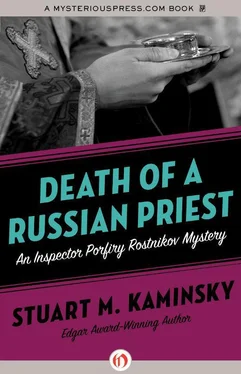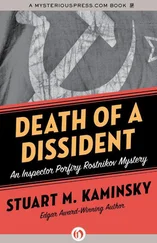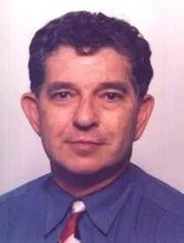Stuart Kaminsky - Death Of A Russian Priest
Здесь есть возможность читать онлайн «Stuart Kaminsky - Death Of A Russian Priest» весь текст электронной книги совершенно бесплатно (целиком полную версию без сокращений). В некоторых случаях можно слушать аудио, скачать через торрент в формате fb2 и присутствует краткое содержание. Год выпуска: 2012, Жанр: Полицейский детектив, на английском языке. Описание произведения, (предисловие) а так же отзывы посетителей доступны на портале библиотеки ЛибКат.
- Название:Death Of A Russian Priest
- Автор:
- Жанр:
- Год:2012
- ISBN:нет данных
- Рейтинг книги:3 / 5. Голосов: 1
-
Избранное:Добавить в избранное
- Отзывы:
-
Ваша оценка:
- 60
- 1
- 2
- 3
- 4
- 5
Death Of A Russian Priest: краткое содержание, описание и аннотация
Предлагаем к чтению аннотацию, описание, краткое содержание или предисловие (зависит от того, что написал сам автор книги «Death Of A Russian Priest»). Если вы не нашли необходимую информацию о книге — напишите в комментариях, мы постараемся отыскать её.
Death Of A Russian Priest — читать онлайн бесплатно полную книгу (весь текст) целиком
Ниже представлен текст книги, разбитый по страницам. Система сохранения места последней прочитанной страницы, позволяет с удобством читать онлайн бесплатно книгу «Death Of A Russian Priest», без необходимости каждый раз заново искать на чём Вы остановились. Поставьте закладку, и сможете в любой момент перейти на страницу, на которой закончили чтение.
Интервал:
Закладка:
During the days of confusion when Yeltsin had barricaded himself in the Parliament Building, Colonel Snitkonoy had found himself torn between two apparently conflicting orders, one from Major General Gurov himself commanding him and his men to support the loyal militia preparing to storm the parliament, and one from a KGB source whose name was indecipherably signed at the bottom of a hand-delivered directive ordering the Department of Special Projects to resist all efforts to undermine the revolution.
The colonel, confused but dignified, had assembled his small staff, manned all phones twenty-four hours a day for the entire week of conflict, and reassured all callers, and there were few, that his office would follow only the orders of those legally empowered to issue them. The result was that he and his staff followed no orders at all until it was quite clear who was in charge.
The result of this position was inaction with the appearance of great activity.
In appreciation of the work and loyalty of the Special Section during the days of tension, the colonel had been given responsibility for “various matters of a delicate investigatory nature as they arise in the newly independent Republic of Russia.”
The colonel was vaguely aware that his mission prior to the new directive had been almost entirely ceremonial, but all that had changed. The Gray Wolfhound and his men now had the official responsibility for politically sensitive cases that no other branch would touch. In short, the Gray Wolfhound’s Special Section was now the unofficial scapegoat of the new and not yet clearly defined criminal justice system.
Colonel Snitkonoy, hands folded behind his back, head held high, continued his regular early-morning meeting, a meeting he had called an hour earlier than usual. “The union for which our fathers fought and died has come asunder. The revolution is over and the images of Lenin are crushed. As Marx said, ‘The task I have set myself is to sweep away the stumbling block which people under the guise of Marxism are offering as order but which is something incredibly muddled, confused, and reactionary.’ And therefore, comrades, we must make the present better so that our children and their children will have a past worth remembering.”
Colonel Snitkonoy had no children and, in fact, had never married, as those who listened knew. He lived in a dacha just outside of Moscow beyond the Greater Ring Road with his former military aide and a woman who served as his cook-housekeeper. It was rumored that his monthly salary was now fifteen thousand rubles compared with the maximum four hundred and twenty rubles a month a uniformed policeman could earn.
The colonel paused at his favorite morning spot, where the sunlight, what there was of it, outlined him dramatically for those who sat before him. “And now, comrades, to our task.”
He looked at the trio at the table and smiled enigmatically. He meant that sly smile to suggest that he was about to give them a philosophical puzzle that only the brightest of them might be able to solve.
The men were looking at the papers in front of them when Rostnikov entered the room behind them. He removed his coat, placed it on an empty chair at the end of the table, and sat.
The colonel looked at the new arrival. Rostnikov looked back at him emotionlessly, then pulled a pad of paper in front of him, removed a Japanese-made Rolling Writer pen from his pocket and began to write.
“Events move quickly in troubled times,” Snitkonoy announced. “A revolution can take place in a moment.”
The three other men at the table looked at Rostnikov, who continued to write on his pad.
“Promptness is essential,” continued the colonel.
Since Rostnikov continued to write without looking up, the colonel turned his attention to his assistant, Pankov, a very small man with thinning hair who held his job primarily because he was such a perfect foil for the colonel. Whereas the colonel, in emulation of the American General MacArthur, changed his clothes three times a day and always smelled fresh and ready for battle, Pankov had been a perspirer even in the days when Petrovka was kept frigid. He was always uncertain, his clothes were always rumpled, and his few strands of hair were unwilling to obey even the most determined attempts to tame them with oil. In appreciation of his assistant’s total inadequacy the colonel never failed to treat Pankov as if he were a bewildered child.
“Pankov,” the Wolfhound said gently but firmly. “Schedule.”
Pankov shuddered as if someone had placed an ice chip from the Moscow River down his back.
“Formatov and Seekle,” he began, “are to report this morning on the thieves who are attacking shoppers in the Cherymushinsky farm market, grabbing their shopping bags, cutting their avoska, their string bags, and-”
Pankov stopped suddenly: The colonel was bored. His department was now beyond such pettiness. “We must continue to improve our efficiency,” he concluded abruptly.
Though the statement made no sense under the circumstances, the Wolfhound nodded indulgently and turned to the man sitting to Pankov’s left, Major Andrei Grigorovich, a blocky man in his mid-forties who had once offended a general without knowing why and, as punishment, had been assigned to the Gray Wolfhound. Considering the recent transfers and suicides (one by way of three bullets to the head) of many ranking members of the KGB and MVD, Major Grigorovich regarded his offense as a good career move. Now he nurtured a renewed spark of the ambition he had once held. With the recent elevation of the Special Section, the major believed it was only a matter of time until the new minister of the interior came to the same conclusion Major Grigorovich had about Colonel Snitkonoy’s competence.
“The daughter of the Syrian oil minister is still missing,” Grigorovich said. “Progress is slow. I suggest-”
“Who is on the case?” asked the colonel.
“Tkach and Timofeyeva,” replied Grigorovich with a touch of scorn in his voice. Sasha Tkach and Elena Timofeyeva were not among those in the Special Section aligned with the major. They, like Emil Karpo, the tall specter to Grigorovich’s right, were known allies of his painfully unambitious rival, Porfiry Petrovich Rostnikov, who sat at the end of the table. Grigorovich noted that Rostnikov had not looked up from his notes since being seated.
“Bring me their reports when they return,” said Colonel Snitkonoy. He turned his gray eyes on Karpo. Colonel Snitkonoy did not like being eye to eye with Investigator Emil Karpo, the unblinking Tatar with thinning hair. Karpo was called “the Vampire” behind his back. To Snitkonoy he looked more like the man who played the somnambulist in The Cabinet of Dr. Caligari, a German silent film he had seen at the Moscow Film Festival of 1984, where the colonel had served as official government host.
“Comrade …” he began, and then corrected himself. “Citizen Karpo.”
“Written reports on the telephone exchange suicide, the woman who claims her dead husband is not dead and is trying to kill her, and the-”
“Old business,” the colonel interrupted. “You must put old business aside. Do you know how many unsolved crimes we have in the records room for the past five years alone?”
“Four thousand three hundred and six as of Monday,” Karpo replied seriously.
“Four thousand three hundred and six,” the Wolfhound repeated, as if Karpo had just come up with the correct answer, which the colonel knew as well as he knew his own military ribbons.
“Anything else, Karpo?” he asked indulgently.
“It was Lenin,” said Karpo.
“Lenin?” repeated Colonel Snitkonoy.
“Lenin, not Marx, who said, ‘Namely, the task I set myself …’”
Читать дальшеИнтервал:
Закладка:
Похожие книги на «Death Of A Russian Priest»
Представляем Вашему вниманию похожие книги на «Death Of A Russian Priest» списком для выбора. Мы отобрали схожую по названию и смыслу литературу в надежде предоставить читателям больше вариантов отыскать новые, интересные, ещё непрочитанные произведения.
Обсуждение, отзывы о книге «Death Of A Russian Priest» и просто собственные мнения читателей. Оставьте ваши комментарии, напишите, что Вы думаете о произведении, его смысле или главных героях. Укажите что конкретно понравилось, а что нет, и почему Вы так считаете.












